That's all from uspublished at 13:27 BST 9 June 2021
Thanks for following along with us today.
The team with you today were Justin Parkinson, Owen Amos, Richard Morris, and Sinead Wilson.
Hope you'll join us again next week.
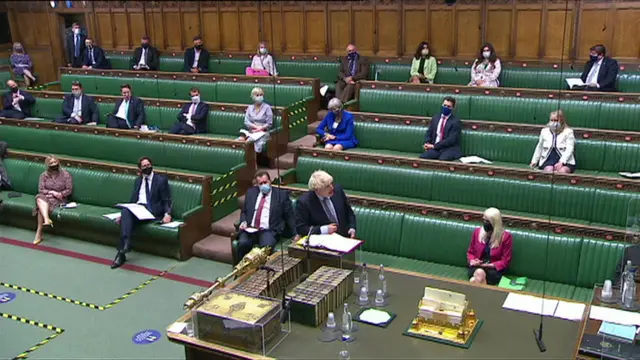 Image source, HoC
Image source, HoCBoris Johnson has faced MPs questions in the Commons
Labour leader Sir Keir Starmer asks Mr Johnson about the recent resignation of education catch up adviser Sir Kevan Collins
Mr Johnson responds by saying the government is funding "the biggest tutoring programme anywhere in the world"
Mr Starmer and the SNP's Ian Blackford both criticise government cuts to foreign aid
The prime minister says the Conservatives have spent "more than Labour ever did" on foreign aid
Former Tory PM Theresa May asks Boris Johnson about the lack of convictions after the Hillsborough disaster in 1989
Mr Johnson will meet US President Joe Biden in Cornwall later, ahead of the start of the G7 summit
Talks between the EU-UK are being held in London to try to find a compromise to post-Brexit rules in Northern Ireland
Edited by Johanna Howitt
Thanks for following along with us today.
The team with you today were Justin Parkinson, Owen Amos, Richard Morris, and Sinead Wilson.
Hope you'll join us again next week.
 Image source, HoC
Image source, HoC Reality Check
Reality Check
Labour leader Keir Starmer said the prime minister was “the only G7 leader cutting his aid budget”.
In 2015, G7 countries committed to spending 0.7% of their gross national income on international aid.
The UK achieved this but is planning to cut spending to 0.5% this year.
Germany was above 0.7% in 2020. France was at 0.53% but has said it will be increasing to 0.7% by 2025.
Other G7 members are at a lower level, external, including the United States (on 0.17%)
The Organisation for Economic Co-operation and Development (OECD) says it cannot confirm whether the UK is the only G7 country cutting foreign aid because it doesn’t have 2021 data for all seven countries.
However, it was not aware of any other country having announced cuts to its aid budgets.

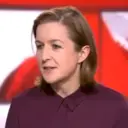 Jessica Parker
Jessica Parker
BBC political correspondent
Sir Keir Starmer and Boris Johnson clashed over catch up funding for students following the resignation of education tsar Sir Kevan Collins.
Sir Kevan said the government’s plan fell “far short” of what was needed.
Sir Keir agreed it’s not enough, while the prime minister passionately defends the plan.
Regardless of any short term tussles, there is likely to be a long term, broader tension; between calls to invest in various sectors - to make up for lost time - versus a desire in some quarters to get greater control over public spending.
So what did we learn from today's session?
Allow X content?
This article contains content provided by X. We ask for your permission before anything is loaded, as they may be using cookies and other technologies. You may want to read X’s cookie policy, external and privacy policy, external before accepting. To view this content choose ‘accept and continue’.
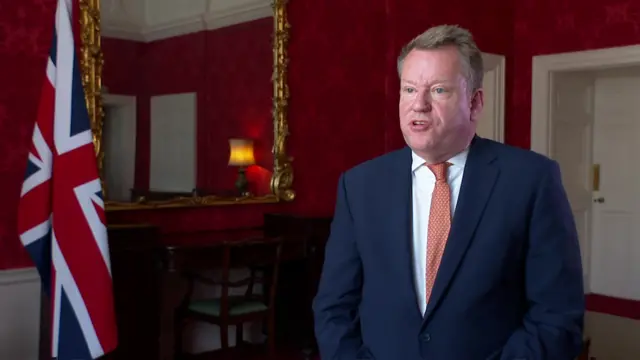
Brexit minister Lord Frost
Lord Frost has said that “there weren’t any breakthroughs, there weren’t any breakdowns either” in the talks with the EU Commission this morning. He said the two sides would “carry on talking”.
In a short interview at the end of today's meeting, the UK's Brexit Minister said there had been “some frank and honest discussions” about the situation in Northern Ireland, including on the movement of chilled meats from GB to NI.
Responding to the suggestion that the UK knew that this was part of the Protocol it signed and needs to obey the rules it agreed, Frost said that “the EU is insisting we operate the Protocol in an extremely purist way.
"The reality is that it’s a very balanced document designed… to deal with very sensitive politics in Northern Ireland” he said.

 Jessica Parker
Jessica Parker
BBC political correspondent
The issue of Brexit - and the Northern Ireland protocol - emerged at Prime Minister’s Questions.
On one side a call from the SDLP for the UK to come to terms with the EU in order to ensure fewer checks.
On the other, a Tory backbencher saying it’s the EU that needs to be more pragmatic.
It’s a strong flavour of the arguments in play at today’s talks – between Lord Frost and his EU counterpart Maros Sefcovic - that have been going on as we speak not far away from Parliament.
Welsh Independent MP Jonathan Edwards asks the PM about the fate of the steel industry - will it be next to be betrayed by Brexit, he asks.
The PM says Brexit offers export opportunities for Welsh farmers.
Labour's Ian Lavery calls the government's catch up help for school children in England "derisory".
He says the PM, who went to Eton and Oxford University, has a "wonderfully privileged education background" and asks him to explain the situation.
Boris Johnson replies that this is wrong and that the scheme in place will make a "huge difference" to pupils.
The issue of forced adoptions is raised by the Conservative Sir David Amess who says thousands of women suffered as a result, including those in his Southend constituency.
Does the PM agree that an apology should be given and an acknowledgement that this was wrong, he asks.
Johnson says he echoes the sentiments about those who have been affected.
But he says the practices can't happen now because the law has been changed to protect people.
The agencies involved have apologised he adds and that's "quite right too".
The BBC has reported the stories of hundreds of women forced to give up their babies for adoption in the 1950s, 60s and 70s.
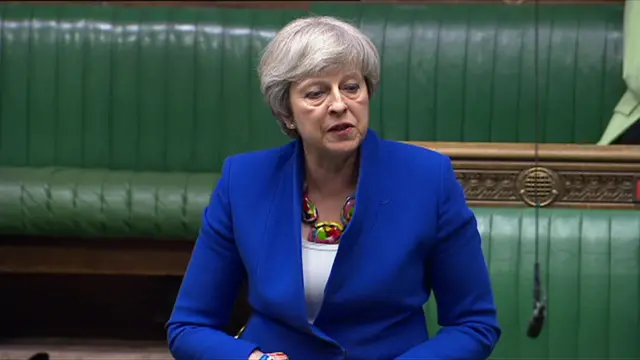 Image source, HoC
Image source, HoCFormer prime minister Theresa May says in April 1989, 96 Liverpool fans "were unlawfully killed at Hillsborough" but nobody has ever been prosecuted for these deaths.
She says the most recent trial collapsed because police evidence had been changed.
She asks for the PM to look at the ramifications of this for future inquiries, and for the families of the Hillsborough 96.
Boris Johnson says the families of those killed in the Hillsborough disaster "have shown tremendous courage and determination".
He says "we will always consider opportunities to consider the law and how it operates" and will be considering this case.
Labour's Andrew Gwynne asks about the resignation of advisers and recent criticisms over standards in government, saying: "Does the prime minister wonder why this keeps happening to him?"
The PM responds that the government takes standards seriously.
Conservative David Jones is up next and he also asks about the ongoing Brexit tensions with the EU.
He says he notes that some in Brussels have problems with Lord Frost, who negotiated Britain's departure.
Jones asks if the PM agrees with Frost's assessment that matters would be easier if the EU adopted a pragmatic rather than a purist approach to implementing the rules.
Johnson says he agrees with Frost "completely" and thinks he is doing an "outstanding job".
Labour MP Fabian Hamilton asks what is being done to avoid marriage and inheritance exploitation.
He says an elderly constituent of his with late stage dementia was married by a man who befriended her.
This, he says, wiped out her previous will, and meant her entire estate was left to him. Since this episode, he says he has been contacted by "hundreds" of other people whose family members have had the same thing happen to them.
Boris Johnson says he will put Mr Hamilton in contact with the relevant people in government to deal with the issue.
Labour's Barry Sheerman asks when the government's "levelling-up" agenda is "going to start", criticising the level of resources and quality of management of projects. The PM responds that people "across the country" are responding to a "massive" investment, transforming "lives, hopes and opportunities".
Colum Eastwood from the SDLP raises the issue of how Brexit is playing out in Northern Ireland with the so-called Northern Ireland protocol.
He asks why the PM is prioritising getting "cheap, dodgy beef from Australia" over the concerns of the people of Northern Ireland and reducing checks in the Irish sea.
The PM says that is wrong.
He says he is prioritising the rights and ability of the people of Northern Ireland to have access to goods from GB and is also protecting the integrity of the UK.
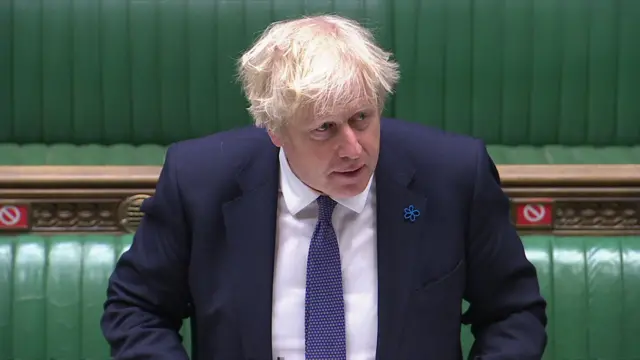 Image source, HoC
Image source, HoCTory MP Scott Benton calls the catch-up help for children in England a "tutoring revolution".
The PM agrees, describing it as an "evidence-based" intervention, offering three to five months' worth of help.
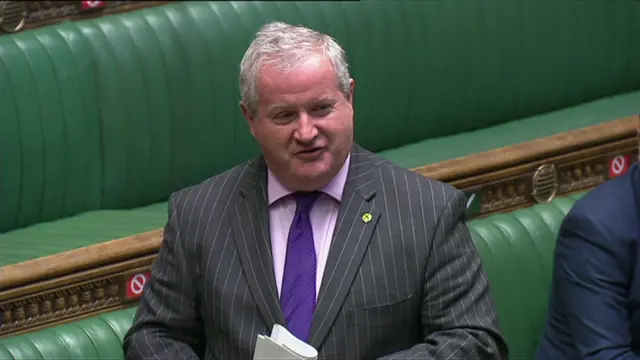 Image source, HoC
Image source, HoCSNP Westminster leader, Ian Blackford, is up.
He wishes all the best to Scotland's team for the forthcoming European football championship.
He says the PM will walk in to the G7 summit as the only country to cut aid spending at a time when people need it most and is "on the run from his own moral and legal responsibilities".
Will Johnson commit to a vote on "his inhumane cuts" he asks?
The PM says people of this country are in favour of the balance the country is striking because we are in very difficult financial times and are already spending £10bn.
But "no-one is safe until all are safe" says Blackford so we should support each other "rather than walk away from those in need".
Johnson repeats his earlier comment that one in three of the vaccines being distributed around the world come from the Oxford AstraZeneca supply.
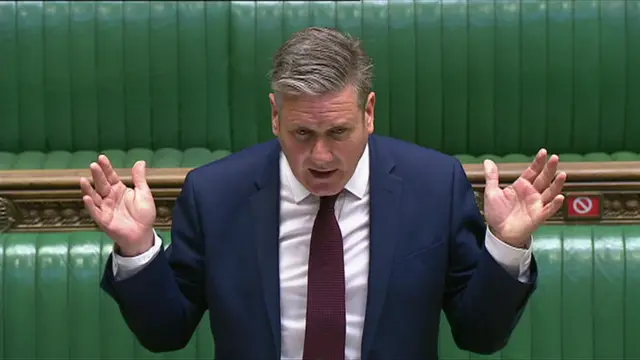 Image source, HoC
Image source, HoCFor his final question, Labour leader Sir Keir Starmer says the government is the only member of the G7 which is cutting its aid budget.
He says business development groups are calling for leadership from the UK on overseas aid.
He says the prospect of a new government in Israel is an opportunity to reset talks in the Middle East for Israelis and Palestinians. He says over 60 Palestinian children died in the latest conflict.
"For too many in Palestine" the "recognition of a sovereign state" is too distant, he states.
Boris Johnson says it's "been a long standing" view of the UK that the way to achieve peace in the Middle East is for a two state solution.
"Under this government, we continue to spend more than Labour ever did" on overseas aid, he adds.
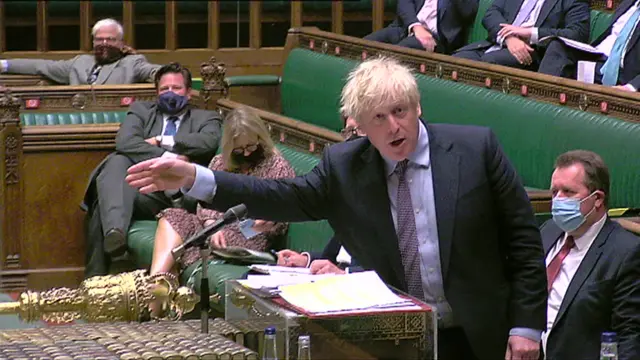 Image source, HoC
Image source, HoC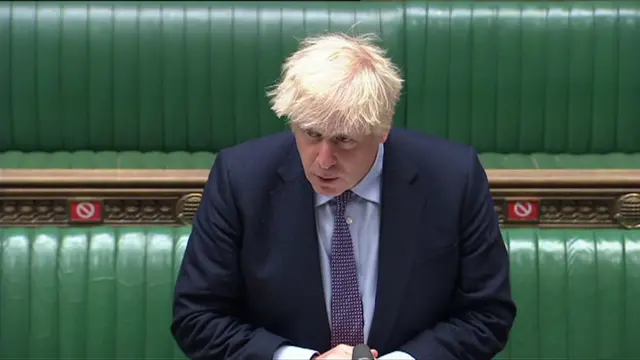 Image source, HoC
Image source, HoCIn his fifth, and penultimate, question to the PM, Sir Keir Starmer says the attainment gap will rise under the government's plans, accusing Boris Johnson of being "all over the place".
Turnng to this week's G7 summit, Sir Keir says the UK must lead a "truly global effort" to increase Covid vaccinations.
Johnson replies that this is "indeed" happening already, and that one in three doses distributed around the world are of Oxford AstraZeneca vaccine.